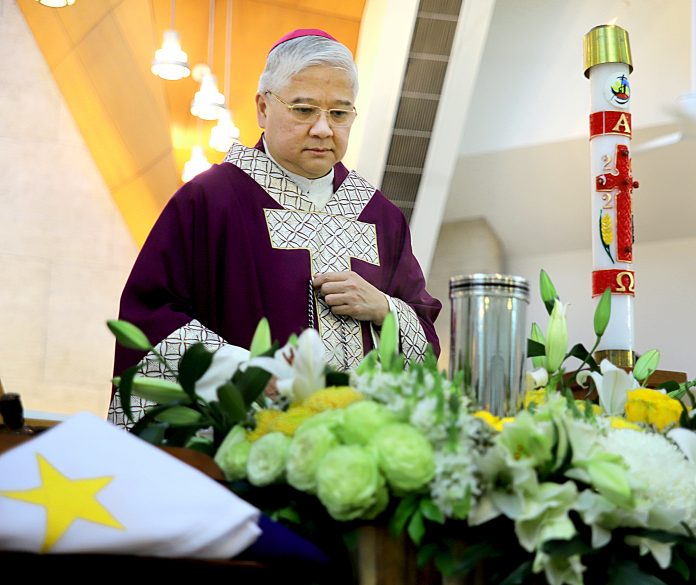We are here to remember what Jesus did and gave us. What did Jesus give us? Jesus gave us freedom. It is good to celebrate freedom in this Church that was built to remember the freedom we won in 1986.
Jesus gave us the freedom not only from enslavement to human masters but He gave us freedom from enslavement to sin.
To celebrate the freedom from the slavery of Egypt, as narrated to us in the First Reading, Jesus came to set us free. Jesus came to set all men and women free.
How did Jesus give us freedom? He did it in three stages.
First, Jesus gave us freedom by being somebody like us. He breathed the air we breathe. He walked the earth we walk. He ate the food we eat. His joys were our joys.
Our pains became His pains also. If we bleed when we are stabbed, Jesus also bled when He was stabbed. If we get hurt when bitten by an insect, He also get hurt and itchy because of insect bites. Everything that we go through, Jesus went through.
Jesus became somebody among us. Jesus was not satisfied with just being in heaven, as a transcendent God. Jesus became a person among us. As we say in the Angelus, “The Word was made flesh and made His dwelling among us.”
That is what we celebrate at Christmas—Jesus became human flesh and was born of the Virgin Mary. That is the first stage of liberating us—Jesus became somebody like us.
Jesus went one step further. He did not only become a human being like us. He did not only become our equal. God became anybody.
God lowered Himself beneath our dignity and became a slave and started to wash the disciples’ feet. God became anybody, not only somebody.
He did not become a very important person. God chose to be anybody.
God chose to be the scum of the earth. God chose to become a person who people take for granted. God chose to become a person who people ignore. God became a person who is a slave, who washes the feet of those who look at Him as a teacher.
When Jesus chose to be a slave and wash the feet of the disciples, He was setting us free from our attachment to our titles, our popularity, our wealth, and our fame.
The world is going to be a better place if we become less and less aware of who we are and become more and more aware of what God has become for the love of us. Jesus became a nobody.
Jesus teaches us the way of being defenseless. He could have defended Himself but He chose to be defenseless. He could have protected Himself but He chose to be without any protection, without any security.
He chose to be nobody.
After choosing to be anybody, and simply nobody, Jesus goes one step further. This time, Jesus becomes something for the love of us. Jesus becomes something and is no longer somebody. He is no longer just anybody, no longer just a slave.
He chooses to become a thing—bread and wine to nourish us. Jesus becomes something—bread and wine for us. Jesus becomes food and drink for us so that we may be free. What love! What love God shows us.
He did not deem equality with God something to be grasped at; rather, He emptied Himself and took the form of a slave. He did not only reveal Himself as an equal among us, but he also lowered Himself and after lowering Himself, washing our feet, and becoming the servant of all, He even gives up that dignity and becomes only a thing—food and drink for us.
That is how great we are. Jesus did all of that: He became a human person; a slave; something for us to eat and drink—because we are so important. Jesus loves us so deeply.
No matter what problems we go through, no matter what people say about us, no matter what happens to us, remember, we are free. Nobody and nothing can take away that freedom.
Jesus gave us freedom. He set all of us free. It is not enough to thank the Lord. Now, it is our turn to look at everybody as equal. If there is anyone who is greater than anyone else, it is the one who stoops down to serve. When we feel that our integrity is being attacked, rejoice, be glad! We are being given an opportunity to become lowly and humble.
We are humble not when we humble ourselves and say, “Di naman.” (Not really.) We are humble not when we humble ourselves but when others humiliate us and we bear it cheerfully—for the love of God.
Should there come a time when we feel that people are stripping us even of our human dignity and we feel that we are being reduced to an object or a thing, rejoice! Say, thank you because God is giving us an opportunity to be what He is—something to eat, something to drink, for the freedom of all.
Reflection of Archbishop Socrates Villegas of Lingayen-Dagupan. Jn. 13:1-15









